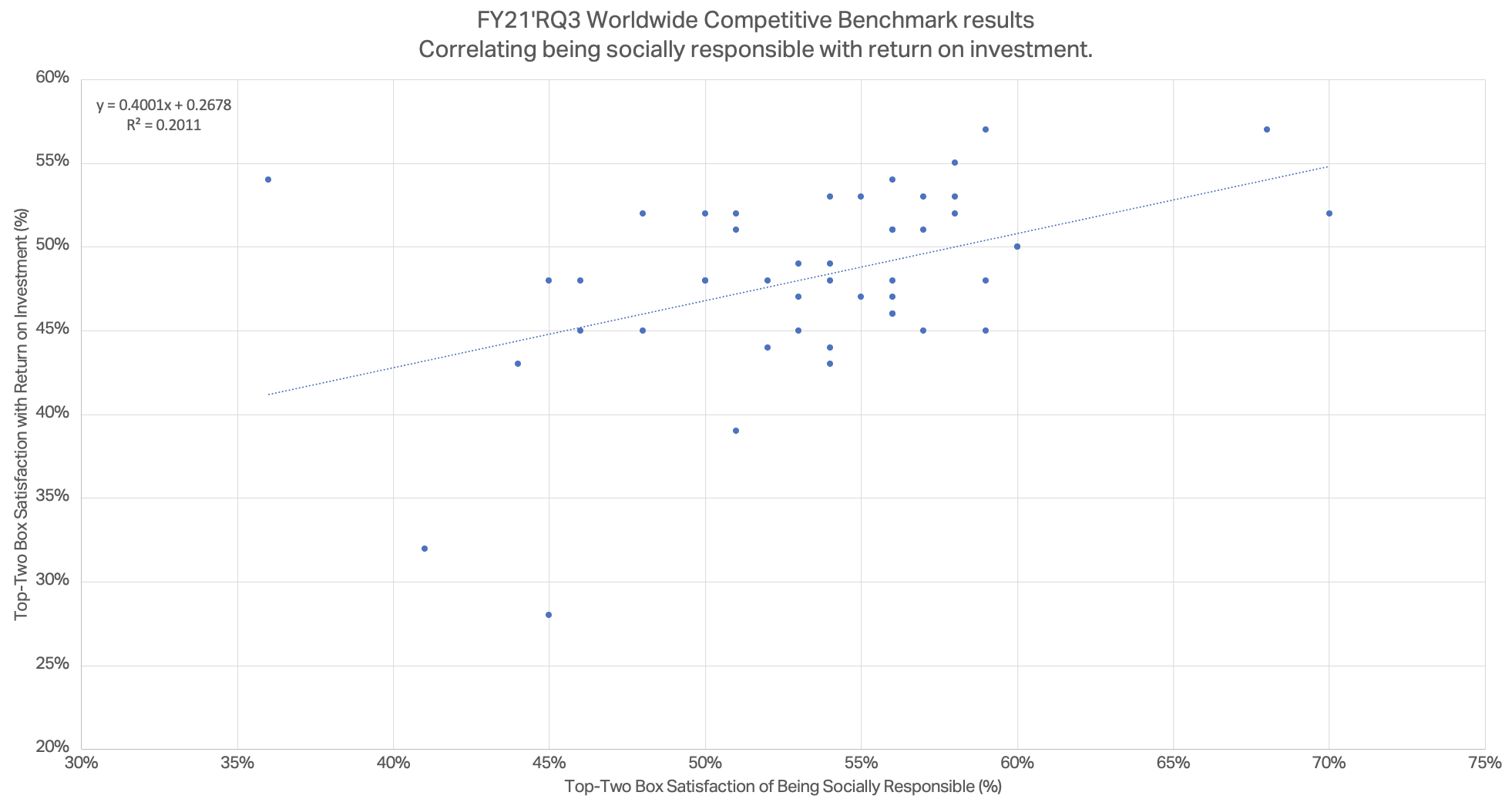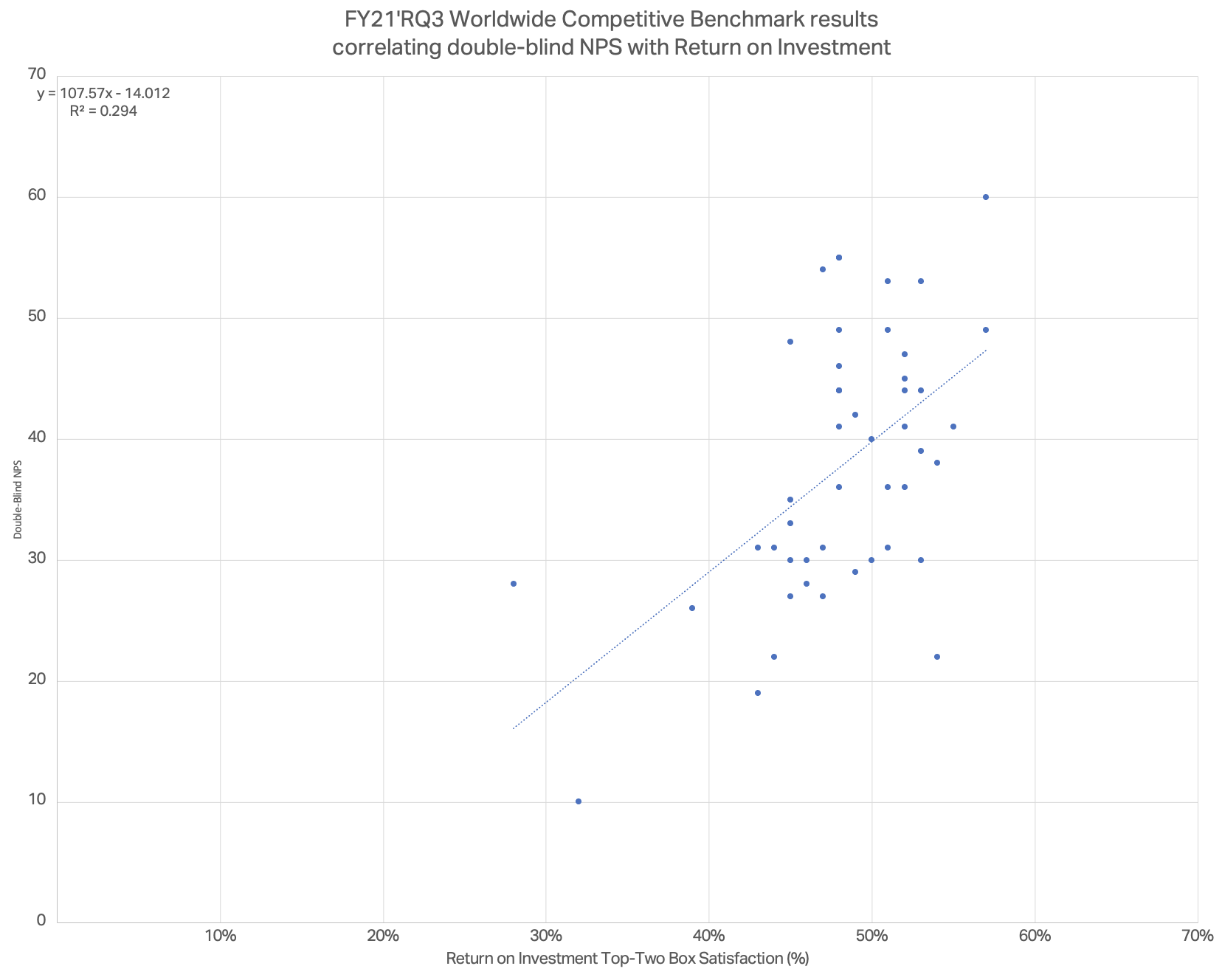Ensure Customers Receive Return on their Software Investment by being Socially Responsible
In our recent work, we have demonstrated the importance of social responsibility and environmentalism for business and have shown how brands are now expected to become guardians of sustainability. To take the example of SaaS – customers care about this (Borderick et al., February 2021) We have also identified how social responsibility directly impacts brand trust (Borderick and Skillen, June 2021). This is imperative: stakeholders, asset owners, and customers all value and trust companies differently based on their commitment to social responsibility, and we should continue to consider our impact on people, communities, and climate goals as we build and transform the company roadmap.
However, the relationship between social responsibility and return on investment remains relatively under-researched. Within the double-blind Competitive Benchmark research, return on investment is defined as: “The cost of ownership compared to the benefits received.” The question then becomes: “Do customers feel, or note, a higher return of investment from brands who are more socially responsible? Let’s find out.
Evidence


Figure 1: FY21’RQ3 Worldwide Competitive Benchmark results correlating being socially responsible with return on investment. The sample size contains over 15,000 responses across the software industry. Both variables are the top-two box satisfaction that customers have with those brands.
Figure 1 presents the FY21’RQ3 Worldwide Competitive Benchmark results correlating being socially responsible with return on investment. The sample size contains over 15,000 responses* across the software industry. Both variables are the top-two box satisfaction that customers have with those brands. This percentage shows the number of customers responding with the top scores. To take the value of 50% as an example, a way of interpreting this would be that 1 in 2 customers liked how socially responsible the brand is, and, conversely, 1 in 2 did not. As can be seen, there is a positive correlation between the two datasets with a product moment correlation coefficient (r2) of 0.2. What would be interesting is to see how return on investment impacts loyalty and customer retention. We could demonstrate this by correlating the impact that return on investment has on the double-blind Net Promoter® Score, since we know that double-blind Net Promoter is correlated with customer loyalty.


Figure 2: FY21’RQ3 Worldwide Competitive Benchmark results correlating the double-blind Net Promoter® Score (NPS) with return on investment. The sample size contains over 15,000 responses across the software industry.
Figure 2 presents the FY21’RQ3 Worldwide Competitive Benchmark results correlating the double-blind Net Promoter® Score (NPS) with return on investment. As can be seen, there is a positive correlation between the two datasets with a product moment correlation coefficient (r2) of ~ 0.3.
Conclusions
As discussed, research around the relationship between Environmental, Social, and Governance (ESG) and return of investment remains in its early stages, and we will continue to measure this relationship over time. However, as we have demonstrated, incorporating ESG practices and social responsibility into brand activities will undoubtedly have a positive impact on company returns. However, ESG investment requires businesses to focus on creating long-term value to both people and the planet. This will not only boost brand reputation, improve customer retention, but will also stimulate economic activity and generate returns that would not have occurred otherwise. Thinking about some of the goals for COP26, specifically ‘Working Together to Deliver’, provides a fantastic opportunity to get this right, to engage in purposeful partnerships, and to create meaningful change through decisive climate action. This, in turn, will promote a shared responsibility between customers, partners, and employees alike, supporting the positive correlation between ROI and social responsibility for businesses.
This article has shown, using double-blind data from over 15,000 respondents across the software industry*, two main points:
(1) Perceived Return on Investment is very important to customers and is correlated with repeat purchasing, loyalty and thus, brand revenue.
(2) Being socially responsible as a brand not only correlates with brand trust, but also correlates with return on investment and loyalty with that brand.
*Sample Size Worldwide: n=15,798. Micro Focus n=1,278, and all competitors n=14,520.
This blog is co-authored by Dr. James D. Borderick, Rosalind Skillen and Kerry Barrett.
This post was first first published on Home | Micro Focus Blog website by DrBorderick. You can view it by clicking here

